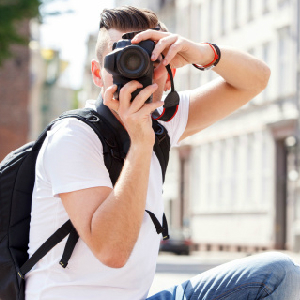Ferguson Events Offer A Reminder: You Can Photograph Police On The Job

THINKSTOCK
It is legal to photograph or video record police officers in public as they carry out their duties. And, as a recent court ruling reinforces, it’s absolutely legal to photograph police on your property, even (rather,especially) during the execution of a search warrant.
Just because something is legal doesn’t mean the police will honor it. That’s the crux of the argument for protest against police who kill in the absence of a threat, or those who, with much greater frequency, deny due process in hundreds of little ways to Americans every day.
The chaos in Ferguson, Missouri, over the police shooting of Michael Brown has drawn national media attention. Reporters from major networks and newspapers have converged on Ferguson to report on the shooting, the rioting and the inevitable, regrettable appearance of Al Sharpton.
But in doing so, the press has become a part of the story. At least two reporters for separate news organizations have been detained simply for documenting what they saw.
Here’s Martin D. Baron, executive editor forThe Washington Post, on the Ferguson Police Department’s treatment of reporter Wesley Lowery. Lowery and another reporter from The Huffington Post were detained inside a McDonald’s after several officers came inside the restaurant, told them to leave and ordered Lowery to stop filming once he’d whipped out his phone to document what was taking place:
Wesley has briefed us on what occurred, and there was absolutely no justification for his arrest.He was illegally instructed to stop taking video of officers. Then he followed officers’ instructions to leave a McDonald’s — and after contradictory instructions on how to exit, he was slammed against a soda machine and then handcuffed. That behavior was wholly unwarranted and an assault on the freedom of the press to cover the news. The physical risk to Wesley himself is obvious and outrageous.After being placed in a holding cell, he was released with no charges and no explanation. He was denied information about the names and badge numbers of those who arrested him.We are relieved that Wesley is going to be OK. We are appalled by the conduct of police officers involved.
At one point after the police had placed Lowery and the other reporter, Ryan Reilly, in a cruiser, Lowery wrote about the following exchange:
A woman — with a collar identifying her as a member of the clergy — sat in the back. Ryan and I crammed in next to her, and we took the three-minute ride to the Ferguson Police Department. The woman sang hymns throughout the ride.During this time, we asked the officers for badge numbers. We asked to speak to a supervising officer. We asked why we were being detained. We were told: trespassing in a McDonald’s.“I hope you’re happy with yourself,” one officer told me. And I responded: “This story’s going to get out there. It’s going to be on the front page of The Washington Post tomorrow.”And he said, “Yeah, well, you’re going to be in my jail cell tonight.”
Lowery’s one foil against the cops was his power as a member of the press. It ultimately worked — he and Reilly were let go after spending a short time in a cell, with no charges filed.
But it’s vital to emphasize that his rights are the same as any American’s: It’s not illegal for anyone to record what the police do in public.
“The arrest and intimidation of journalists for documenting the events in Ferguson is particularly disturbing because it interferes with the ability of the press to hold the government accountable,” wrote The Atlantic’s Olag Khazan last week. “But actually, anyone — journalist or otherwise — can take a photo of a police officer.
“Citizens have the right to take pictures of anything in plain view in a public space, including police officers and federal buildings. Police cannot confiscate, demand to view, or delete digital photos. Private property owners can set different rules for recording, but it did not appear from Lowery’s account that the McDonald’s manager was objecting to his video recording… Police officers frequently ignore these laws.”
And there’s the rub. Americans must routinely weigh their risks before participating in legal activities — if the police are nearby.
No comments:
Post a Comment
Thanks for commenting. Your comments are needed for helping to improve the discussion.